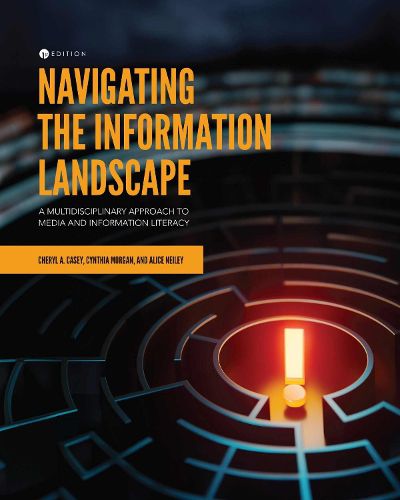Readings Newsletter
Become a Readings Member to make your shopping experience even easier.
Sign in or sign up for free!
You’re not far away from qualifying for FREE standard shipping within Australia
You’ve qualified for FREE standard shipping within Australia
The cart is loading…






Navigating the Information Landscape: A Multidisciplinary Approach to Media and Information Literacy offers readers a foundational understanding of our current, extensive information environment. The book begins with historical foundations, exploring the impact and evolution of information revolutions, from large-scale shifts to how libraries preserve history's facts and tales. It also addresses the troubling history of misinformation and the fluctuating nature of truth. Continuing in the vein of practical application, the book addresses techniques for analyzing information, fostering critical thinking about information behavior, cognitive biases, media studies, rhetoric, and the media ecology of the digital information age. Subsequent discussions tackle the political economy of information, identity, fake news, conspiracy theories, and data comprehension, culminating in the presentation of a toolbox for navigating and contributing meaningfully to the information landscape. Navigating the Information Landscape equips students with the skills to discern and manage the deluge of data and narratives we encounter daily. Developed to help readers become adept information consumers, the book is ideal for courses and programs in media studies, communication, information sciences, and interdisciplinary programs that emphasize media and information literacy.
$9.00 standard shipping within Australia
FREE standard shipping within Australia for orders over $100.00
Express & International shipping calculated at checkout
Navigating the Information Landscape: A Multidisciplinary Approach to Media and Information Literacy offers readers a foundational understanding of our current, extensive information environment. The book begins with historical foundations, exploring the impact and evolution of information revolutions, from large-scale shifts to how libraries preserve history's facts and tales. It also addresses the troubling history of misinformation and the fluctuating nature of truth. Continuing in the vein of practical application, the book addresses techniques for analyzing information, fostering critical thinking about information behavior, cognitive biases, media studies, rhetoric, and the media ecology of the digital information age. Subsequent discussions tackle the political economy of information, identity, fake news, conspiracy theories, and data comprehension, culminating in the presentation of a toolbox for navigating and contributing meaningfully to the information landscape. Navigating the Information Landscape equips students with the skills to discern and manage the deluge of data and narratives we encounter daily. Developed to help readers become adept information consumers, the book is ideal for courses and programs in media studies, communication, information sciences, and interdisciplinary programs that emphasize media and information literacy.